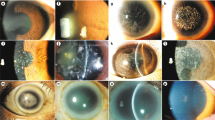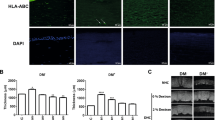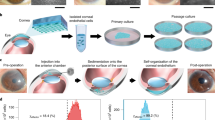Abstract
IT has now been established that homografts of cornea and cartilage behave quite differently from skin homografts and can survive for long periods. The clinical success of the corneal graft has been known since 18781, and there is ample evidence from histological and autoradiographic studies of experimental corneal homografts to confirm that they remain viable long after homografts of tissues such as skin are destroyed by the host tissues2–4.
This is a preview of subscription content, access via your institution
Access options
Subscribe to this journal
Receive 51 print issues and online access
$199.00 per year
only $3.90 per issue
Buy this article
- Purchase on Springer Link
- Instant access to full article PDF
Prices may be subject to local taxes which are calculated during checkout
Similar content being viewed by others
References
Sellerbeck, E., Arch. Ophth., 24, 189 (1878).
Bacsich, P., and Wyburn, G. M., Proc. Roy. Edin., B, 62, 321 (1947).
Bacsich, P., and Wyburn, G. M., Brit. J. Ophthal., 36, 438 (1952).
Bacsich, P., and Wyburn, G. M., Trans. Bull., 1 (1954).
Author information
Authors and Affiliations
Rights and permissions
About this article
Cite this article
BACSICH, P., WYBURN, G. Corneal Homografts. Nature 178, 1228–1229 (1956). https://doi.org/10.1038/1781228b0
Issue Date:
DOI: https://doi.org/10.1038/1781228b0
Comments
By submitting a comment you agree to abide by our Terms and Community Guidelines. If you find something abusive or that does not comply with our terms or guidelines please flag it as inappropriate.



